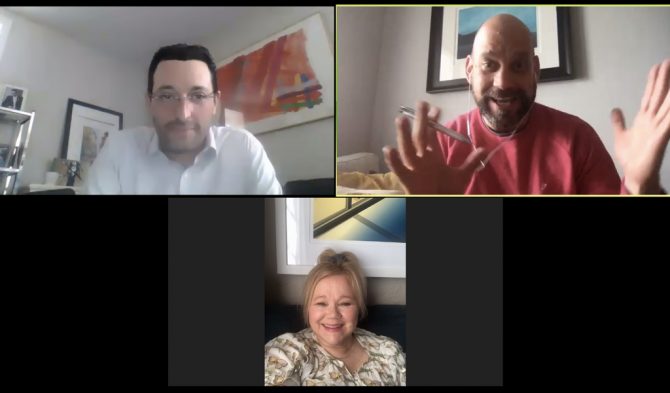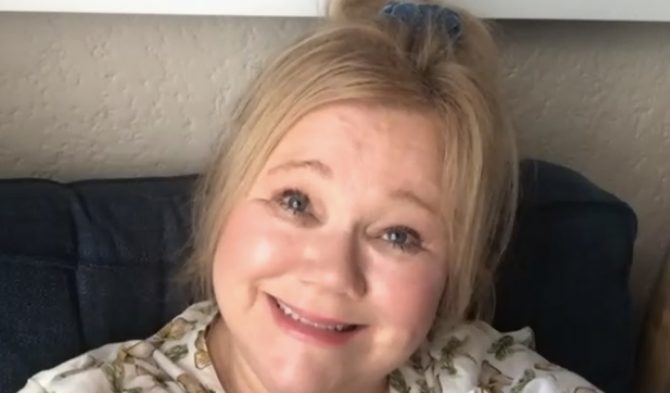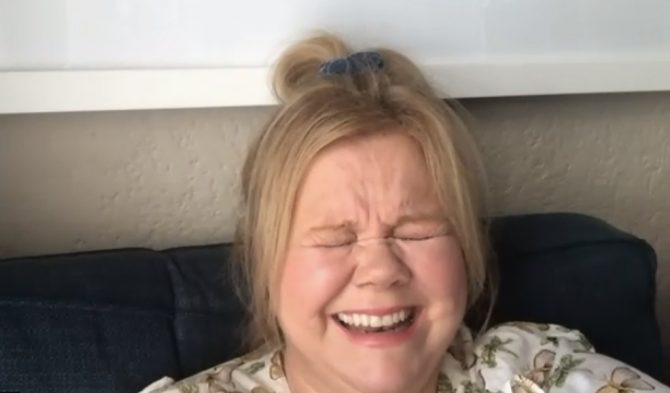Toronto Film School Students Crack Up With Caroline Rhea During Latest Instalment of In Conversation Series
From her humble beginnings as the least funny person in her family to spontaneous hug muggings at the hands of her tween Aunt Hilda fans, to backstage back rubs with Al Pacino – Caroline Rhea shared countless amusing anecdotes from her 30 years as a stand-up comedian during her recent In Conversation with Toronto Film School students.
Hosted by Toronto Film School’s Executive Producer in Residence Andrew Barnsley and Writing for Film & TV Program Director Adam Till, Rhea’s oft-times hilarious 90-minute Zoom session on April 16 covered all facets of the Quebec native’s career as a comedian, actor and host.
Best known for her role as Hilda Spellman on the hit series Sabrina The Teenage Witch, Rhea currently stars in Disney Channel’s Sydney to the Max, hosts the hit game show Caroline and Friends, and is a regular panellist on ABC’s Match Game with Alec Baldwin.
On growing up in Quebec
“I grew up as the youngest of three girls. My dad was a doctor and my mom was an antique dealer. My mother was the funniest person I know and my father was the second funniest – I’m by far the least funny person in my family of five. But I always wanted to be a comedian and I always wanted to be an actress since the time I was in Grade 4…I actually started out writing plays when I was very little and doing performances.
“And then I went to university. I thought I was going to be a business major, so I studied Economics. But then I went home to Montreal in about ’87 because my stepfather was sick, and I got a job at Centaur Theatre. Working at a theatre, I was beside what I wanted to do. I was in the position that you get where you’re looking at your dream very closely, but you’re on the other side of it. So, I really thought, ‘You know what? I don’t want to be working for the artistic director sending contracts out to actors’ – often the wrong contract, because I was terrible at my job – I wanted to be in it myself.”
On moving to New York to chase her dream of becoming a stand-up comedian and actor
“I moved to New York in 1989 with $300, and I bought a pair of earrings for $220 the second day I was there. So, obviously I was very good at budgeting. I moved in with my sister to ruin her life. And then I took at stand-up comedy class at The New School with Scott Blakeman. That was March 3, 1989, and I went on stage the first time on May 3, 1989. Then I, without even having read Malcolm Gladwell of the future, I went on stage 500 times a year, for as often as possible. And I just went on stage as many times as I could, because you have to hone your skills, regardless.
“There was so much rejection, so much need for perseverance – but I had the greatest quality, which was complete and utter faith that I was following what I was meant to be doing. And I was in denial. I had no idea it was meant to be as hard as it was, so it wasn’t. I know that sounds crazy, but it worked.”
On early success as a stand-up comedian
“I started to get successful as a stand-up comedian because – and I think this is very important for anyone who’s listening who’s a writer – I wrote material that I was the only one who could deliver, truthfully…I realized why I was in any way going to be successful was not because I was different from anyone, but because I was exactly like everyone else and because I was willing to share my unique perspective on the fact that we are all the same. So, people started to relate to me.
“And then I thought, ‘I’m going to talk about everything women should talk about.’ And even though I’m very well known for being in a kids’ show, I talked about sex a lot more and everything that would liberate women. I sort of just took it upon myself to be this voice, and then I was the relatable voice of a woman.”

On her need for connection
“I have – and it’s been so hard for me during this pandemic, I think I’m going to cry – an overwhelming need to connect with people. I want to hear your story as much as I want to tell you mine. I also describe my sets as dinner parties, because I know what I’m going to bring, but I don’t know what you’re going to bring, and together we’re going to have this cool combined event that happens.”
On nearly missing out on, then nearly passing on the Aunt Hilda role on Sabrina the Teenage Witch
“My friend called me, Nell Scovell, and she said, ‘Caroline, will you please reconsider the part on Sabrina?’ and I said, ‘What are you talking about, Nell?’ and she said ‘Your managers passed on it six weeks ago, but they’re going to test tomorrow and I really feel like you could do it.’
“I’d never even heard of it. Managers sometimes do that without even telling you. It’s terrible, they just make a decision. Mine were fired shortly after. And I said, ‘Well, send it to me.’ This was so long ago they sent it to the fax machine across the street… And I read it – and I was so mad at my ex-boyfriend at the time, this is very embarrassing to tell you – and it said ‘Aunt Hilda traps a man in her ring for not loving her. And I said, ‘I’ll do it!’ Not kidding. As if it was real.
“And then, I flew to California and I met with Sabrina, Melissa Joan Hart, and her mom and I went to the first two auditions, and then they sent me to the network to test, and before I did the test, I said ‘I’m sorry, I’m not feeling this, I don’t have a vibe, I’m not going to do it.’ And they were so mad at me – they were furious. So, I flew home to New York and the next week, they called me and said, ‘You know what? You don’t have to test. The part is yours if you’ll do it.’ And I said, ‘No!’ And then I called my mother, and she said ‘Have you lost your mind??? Have you completely lost your mind? You will do it. Call them back.’ So, I called them back and I got the part.
“Truthfully, I didn’t want to do it because I went to a psychic and the psychic said, ‘That show will be on the air for seven years.’ And I said ‘I don’t want to do a show for seven years!’ What an idiot.”
On her Sabrina fandom
“I remember about two months in, I was walking down the street in New York for the first time since the show had aired, and there were about 20 seventh graders on the other side of the street. As they ran towards me, I thought, ‘I’m going to be mugged my teenagers, this is humiliating.’ But they hugged me! They group-hugged me. It makes me cry now.
“That’s why I love the kids who grew up with that show. I have such an affinity for those kids, because I will always have this connection with them…
“My most famous day, I was at Disney World with 300 screaming children, and I signed autographs for every one of them. And for a moment, I thought ‘I’m a big hoo-ha’ – until I looked at the autograph books, and the other people who had signed were Tigger, Winnie the Pooh, Eeyore…I’m really not that big of a deal.’

On being known for an iconic role
“I have a lot of friends who are in this position of being known for an iconic role, and some are bitter about it, that it didn’t let them continue to grow, but I truly believe that that is a choice…I would not change one second of being Aunt Hilda…
“And I did go on to do other things. I was on a series called Sordid Lives, which was my favourite thing. I played a southern, very trashy character. It was like Desperate Housewives in a Texas trailer park. In it, Rue McClanahan is having an affair with my husband, and Olivia Newton-John plays a lesbian country singer. And I used to be in hair and makeup between Rue McClanahan and Olivia Newton-John, and my inner 14-year-old from Canada…just wanted to turn to Olivia Newton-John and go, ‘I’m hopelessly devoted to you,’ and to Rue McClanahan, ‘Thank you for being a friend.’ We shot 12 episodes in 16 days, and it is, by far, the best acting I have ever done in anything.”
On remaining grounded
“I always joke that some celebrities are intimidating, but I’m the kind of celebrity where fans eventually say to me, ‘I’ve gotta go,’ because I’m super chatty…
“You have to remain grounded, because (fame) is all nonsense. You are no different from any other human being. None whatsoever. Always be kind to everyone. I once saw an actress who I really loved be rude to a fan, and it hurt my heart. She was diminished in my mind that she thought that that was okay. Alfred Hitchcock was mean to my mother when she asked for a picture, and it hurt me to the core.
“So, remember, you’re just like everyone else, and if you’re lucky enough to have somebody appreciate your work and want to take your picture or say hello to you, you are to be as gracious as possible, because it’s a gift that you get to do what you get to do, and it takes a lot of courage for someone to walk up to a stranger and say that they like them.”
On pushing through failure and rejection
“This is something for all you students to really, really, really remember, and it’s so hard and painful…Every failure is leading you somewhere. And it’s painful at the time – not getting a job, getting fired, something being picked up that you were supposed to be on – there’s so much potential to go to a place of being bitter, but that does not serve you in any way…
“I think how to process disappointment is the trickiest thing – it really is. But if I could just be as clear as possible: It is not the end, it is just the end of your perception of things going that particular way. It is not the end. I will tell you, I was fired at 24 from an improv group because they told me I wasn’t funny. And I’m pretty sure they’re all dental hygienists now.”
On fighting the urge to be politely Canadian
“I honestly think that, as a Canadian and as a woman, the instinct is often to let somebody else go ahead and you sort of sit back. And I want you to fight that every instinct that you have. You are the most important person and your life is your story and your movie that you are writing and starring it.”

On what makes a great director
“The best director I ever had was Del Shores, and it was because he was an actor first and he knows how to direct an actor to get the best out of them. And the worst kind of director is a director who frightens you and makes you less than. And a great director is someone who makes you bigger than you ever thought you could be, which is what he did.”
On acting versus stand-up
“In my career, I’ve gotten to do a lot. I host, I act, and I do stand-up, but at the end of the day, if you told me there was only one thing I could ever do – besides a love scene with Benicio Del Toro – it would be stand-up. Live stand-up.”
On what she’d tell her 20-year-old self
“I would tell myself not to worry about boys. I would tell myself to not think of immediate gratification and think more about long-term gratification. I would tell her to invest in things and really know that it’s going to take a while to percolate – which I’ve done in certain areas of my life, but I’m an Aries, so that’s a hard one. I would also tell my 20-year-old self that probably now would’ve been a good time to do a nude movie. Haha! No, to persevere – I’d tell her to persevere…”
On why is bravery important in this industry
“I’m going to tell you something: your comfort zone is the last place you want to be. Your comfort zone is a big, fat trick and it plays with your mind. When you are really your most comfortable, that’s when you need a big shove to do something else, to get out of that comfort zone and go to the next level of what it is you’re here to do and to create. But it’s really hard. It’s really hard when finances are involved and you want security and you want to take care of things. But I moved back to Los Angeles in my 50s with a tween, okay? Talk about brave!”
On giving Al Pacino a back massage
“I got to host the Writer’s Guild Awards once, and I was backstage with Al Pacino. It was just the two of us, because he arrived 30 minutes early, and we were chatting. He was having terrible back pain, so after 10 minutes, I said, ‘Do you want me to rub your back?’ And he goes, ‘Would you mind?’ So, I’m rubbing his back and 10 minutes later, I said, ‘Well, I know I feel better.’
On the impact of the COVID-19 crisis
“For filmmakers, I think you have a great opportunity, because there’s so many more stories to tell, and…in isolation, I think people have done so much more self-reflection. If you’re a writer, you’ve probably gone about 10 layers deeper, whether you wanted to or not.
“For my birthday, I did a fundraiser for Comedy Gives Back, because the people closest to me are comedians, and they have all lost their livelihood for the moment. But this is a setback, it is not the end of the story.
“I was thinking about this, and I think what’s going to happen is, comedians are so clever and innovative and people who adjust, so I was thinking that now would be a really fun time to have radio plays again and radio shows. To use their brilliant comedic minds in that way…
“I hope people are writing stories about the heroes of this time, and I want people to really appreciate that it’s the great equalizer: Right now a grocer and a doctor are the most important people in our lives, you know?”


